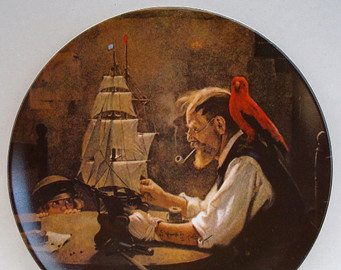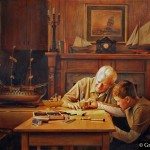
One of my favorite paintings is by Norman Rockwell. It is called The Shipbuilder, and it is the theme picture for this blog, so go back and look at it again.
As you can see, it depicts an older grandpa figure with a sailors cap, a pipe hanging from his mouth, a parrot perched on his shoulder, and a fading tattoo on his arm. The room is dimly lit and he is totally focused on building a model ship.
A young lad, most probably his grandson, is peeking over the work table watching in wonder. He is enamored with his pop, who with calm and focus, is applying his skills to make something beautiful. He has mastered a building skill and now has the ability to give an amazing gift back to his family and friends.
Another favorite painting of mine is The Apprentice, by Greg Olsen. Here we see a similar scene: a grandfather with his grandson, this time both of them together building a model ship. In this painting we see the same calm focus of two men, one past his prime and one entering into it.
- The Apprentice
This two paintings are icons of education. In both scenes we see the master, or tutor, the apprentice, and the project, the task, the goal. First the master engenders wonder, the lad watches and dreams, the master gives him a try, and off he goes! These are the kinds of lessons boys yearn for and yet so often they do not “get a try.” They yearn for skills and knowledge they can apply to some task, project, mission, and yet so often education is a passive sitting down in rows experience that leaves them inert, inattentive, and frustrated. And we wonder why Ritalin is handed out with reckless abandon (but that issue is for an upcoming post). They want to solve problems and build things; they want to write plays and songs; they want to act, to speak, to explain; they want to film movies, record albums, and make a sketch portfolio; and they want to explore nature, no longer pretending they are explorers, but to actually discover and identify.
These more active learning experiences are often lacking because we have forgotten what it means to be a boy and how to teach them. We keep them in desks, doing make work that teachers can’t possibly grade with precision, and is often mere paperwork and pretend. Boys spend countless hours wasting time in class, while they could be working on projects, tasks, and missions through which they learn real skills and see the end goal. We have created a standardized system in academia that is governed by tests and the collegiate track to such an extent that many boyhood experiences are eliminated in order to cover the massive amount of content that is supposedly necessary for them to imbibe. Meanwhile, many boys are floundering through the papers and pens, losing their own identity because they can no longer connect classroom work with the real world. This is one of the main problems in our educational system.
Why are so many boys, and young men for that matter, disengaged in classrooms and left unfulfilled at home? Why are so many walking out of elementary, high school, college, and yes, even grad school, without a firm sense of the role they are to play in life? Why?
It is because we have separated education from life–from the various tasks, roles, jobs that these young men ought to take up now, not just after they graduate. I remember asking a young high school fellow who was entering U of I engineering school if he ever built, fixed, or invented something. He said no. Most of his study took place through reading a textbook and sitting in a desk all day. I remember a boy in middle school who was one of the best public speakers/actors in his class, and yet due to the overemphasis on paperwork and tests, he continually saw failure and experienced frustration. Now, I am not against tests, but there is an overemphasis and a lack of creativity regarding assessment in our current system–in part because we seek efficient assessment devices that can track a massive centralized system. Well, this is for another post, but I’ll just say this–beware of the centralizers–for big is unwieldy and small is beautiful!
We need to rethink how we are preparing our boys for life as men through schools and centers for education. There is a serious danger in the most popular approach: sit through tons of passive classroom experiences, learn how to take the tests, get into college for the experience, and then hope that grad school actually helps you discern the right path. Meanwhile we have raised the debt ceiling for our son or daughter so high that they no longer have a roof over their head.
At Riverside we are developing a new Tutorial approach to teaching boys, one that balances the great heritage of classical liberal arts learning with a workshop style approach that like the two paintings in this post, direct the restless energy of boys towards end goals that they can exhibit, show, and be proud of. Though it is easier to wrap our minds around how a model shipbuilding workshop would engage the interest of boys, it is more difficult to apply this approach in the area of speaking, writing, and reading. But it is possible.
Don Bosco had his young orphan lads publish newspapers; Erasmus saw the importance of making learning a game or competition; Montessori believed that education was a preparation for “going out” into the world. Each of these educators had great insights into how to engage the young.
Imagine a creative communications workshop wherein the boys are producing radio shows: interviewing famous historical figures, performing dramas, giving speeches, or reporting on an important event or discovery. Imagine a workshop in which they are publishing journals and newspapers through which they learn various styles of writing–from straight reporting to editorials and sports articles. Imagine boys making short nature documentaries and recording voiceovers based on what they learned through natural history sessions. Imagine them learning how to give a sales pitch, interview a CEO, or make a presentation. Imagine boys reading good books and learning how to tell stories and recite poetry. We must recover the lost art of storytelling. It is not only important for the formation of their moral imaginations and the recovery of culture–for a people who do not know their story will forget who they are–but also so that they learn to be great communicators.
I remember that most of the fellas at school who were the most active and entrepreneurial were involved with clubs like newspaper, yearbook, shop class, or theatre. They saw the end goal–the product of the skills they were mastering– and they had something to show for it in the here and now. Boys get frustrated with activities that seem to be randomly assigned by a teacher, without any sense of where the lesson is going. Now, certainly the Miyagi-esque method, “Wax on! Wax off!” can work as well, and we all know that boys will never understand why for instance, diagraming sentences is important–though if there was a Duck Hunt like game for diagramming, they might enjoy it more.
We are often too afraid to get our young lads working now. There is so much talk of preparation and getting reading for the real world, that they do not enter into the real world for years down the road. Their lives are too soft, filled with study and prepping for college. We thus have the plague of an “extended adolescence” wherein young men are still wasting their time playing video games instead of learning interesting new skills. We wonder why a culture of manhood is waning, and yet we then do not give them the boyhood challenges they need–those coming of age experiences, or gateways to manhood. Boys want to “do” now–they are tired of paperwork and pretend! Male teachers are tired of this too, and this is why there is a serious male teacher shortage–but that’s for another post as well.
Therefore, we introduce to you the Riverside Center for Education, which takes the old apprenticeship model and balances it with the classical liberal arts–through the Tutorial–a vibrant and active creative communications workshop rooted in great stories, dialogues, speeches, and other great fodder for their imaginations, hearts, and intellects.
There are other programs as well that are even more hands-on, like Maker, Film, and Ranger. Boys do not just need skills though. They also need to be guided by the compass of moral wisdom attained through the study of the liberal arts.

